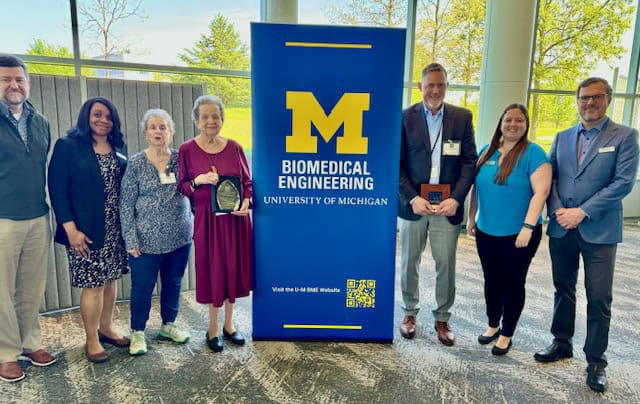
BME Hosts Successful Symposium with Glenn V. Edmonson Lecture
Thank you to all of our faculty and student presenters and our expo participants.

Thank you to all of our faculty and student presenters and our expo participants.
The annual BME Symposium with Glenn V. Edmonson Lecture welcomed 216 attendees on May 8 at the NCRC Building 18 Dining Room. U-M BME is grateful to the family of Professor Glenn V. Edmonson, who endowed the lecture in their father’s/grandfather’s name, and to Dr. Karl J. Jepsen, who was this year’s featured lecturer. Thank you to all of our faculty and student presenters and our expo participants.
The Glenn V. Edmonson Lecture honors the legacy of the first graduate chair of the Biomedical Engineering program. As part of our annual symposium, 50 graduate students received 88 nominations during the Edmonson Scholarship competition.
The following four students received the Edmonson Scholarships:
Finalists
A poster competition is also held in conjunction with the event.
This year’s winners:
The BME Symposium and Glenn V. Edmonson Lecture annually provide a forum for BME faculty and students campus-wide, along with our collaborators, to present current research progress and discuss future opportunities at the interface of engineering and medicine.
Dr. Karl J. Jepsen served as the 2024 Glenn V. Edmonson Lecturer. Dr. Jepsen, a U-M BME graduate, is the Associate Dean for Research and a Professor in the Departments of Orthopaedic Surgery and Biomedical Engineering at the University of Michigan. Dr. Jepsen highlighted “Giving a Voice to a Silent Disease” in his presentation. Dr. Jepsen received his Ph.D. from the University of Michigan in Bioengineering and did his postdoctoral training at Case Western Reserve University in Orthopaedic Surgery. He had expertise in bone biomechanics and imaging, and studied bone as a complex adaptive system during growth and aging with the goal of identifying individual pathways leading to skeletal fragility. His scientific area of interest provided a strong appreciation for how multiple components within a system work together to generate a functional outcome and how disease mechanisms are often resolved through interactions among scientific disciplines. His research program had been funded through grants from federal, industry, and foundation sources such as the National Institutes of Health, Department of Defense, and Doris Duke Charitable Foundation. In addition to serving as Associate Dean for Research, his administrative qualifications also included Chair of the Research and Academic Safety Committee, Director of the Michigan Integrative Musculoskeletal Core Center, and a former role as Associate Chair of Research for the Department of Orthopaedic Surgery.